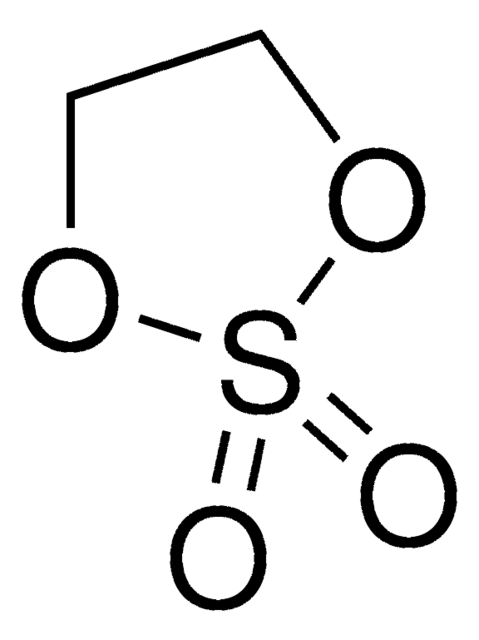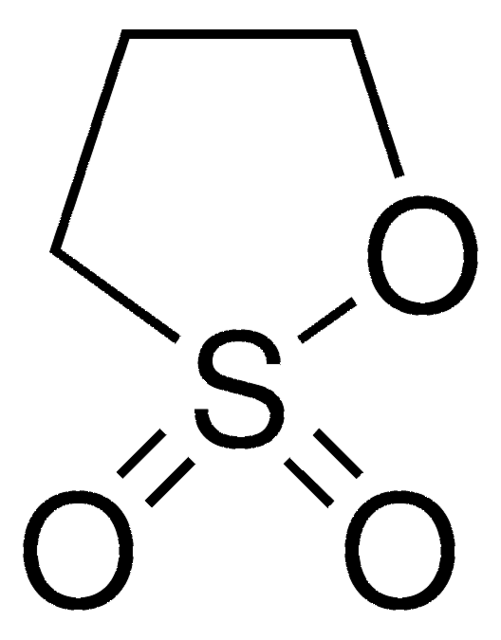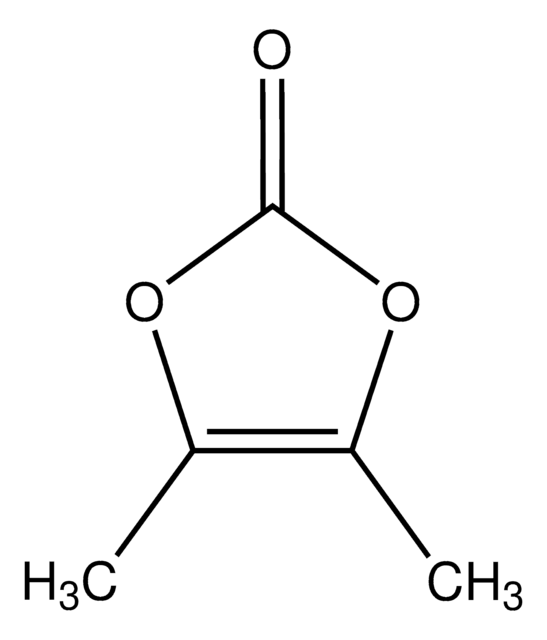809977
Vinylene carbonate
battery grade, 99.5%, acid <200 ppm, H2O <100 ppm
Synonyme(s) :
1,3-Dioxol-2-one, VC
About This Item
Produits recommandés
Qualité
battery grade
Niveau de qualité
Description
Moisture: <10 ppm
Acid content: <10 ppm
Pureté
99.5%
Forme
liquid
Impuretés
≤100 ppm H2O
≤200 ppm acid
Indice de réfraction
n20/D 1.421 (lit.)
Point d'ébullition
162 °C (lit.)
Pf
19-22 °C (lit.)
Densité
1.355 g/mL at 25 °C (lit.)
Application(s)
battery manufacturing
Chaîne SMILES
O=C1OC=CO1
InChI
1S/C3H2O3/c4-3-5-1-2-6-3/h1-2H
Clé InChI
VAYTZRYEBVHVLE-UHFFFAOYSA-N
Vous recherchez des produits similaires ? Visite Guide de comparaison des produits
Catégories apparentées
Description générale
Application
Caractéristiques et avantages
✔ Improves Anode Performance
✔ Forms Stable SEI
✔ Increases Cycle Life
Autres remarques
These additives have low water content (less than 100 ppm). Please handle under inert and moisture free environment (glove box). Keep containers tightly closed. Keep away from heat and ignition sources. Store in a cool and dry place. Avoid storing together with oxidizers.
Informations légales
Produit(s) apparenté(s)
Mention d'avertissement
Danger
Mentions de danger
Conseils de prudence
Classification des risques
Acute Tox. 3 Dermal - Acute Tox. 4 Oral - Aquatic Chronic 2 - Eye Dam. 1 - Skin Irrit. 2 - Skin Sens. 1 - STOT RE 2 Oral
Organes cibles
Liver,Stomach
Code de la classe de stockage
6.1C - Combustible acute toxic Cat.3 / toxic compounds or compounds which causing chronic effects
Classe de danger pour l'eau (WGK)
WGK 3
Point d'éclair (°F)
176.0 °F - closed cup
Point d'éclair (°C)
80 °C - closed cup
Certificats d'analyse (COA)
Recherchez un Certificats d'analyse (COA) en saisissant le numéro de lot du produit. Les numéros de lot figurent sur l'étiquette du produit après les mots "Lot" ou "Batch".
Déjà en possession de ce produit ?
Retrouvez la documentation relative aux produits que vous avez récemment achetés dans la Bibliothèque de documents.
Les clients ont également consulté
Articles
Experts discuss challenges and production processes of nickel-rich layered oxide cathode materials in energy storage systems.
Due to the adverse impact of the continued use of fossil fuels on the earth’s environment and climate, researchers have been asked to develop new approaches for producing power using renewable sources like wind and solar energy
Ionic liquid electrolytes explored for rechargeable batteries' advancement; future IL development discussed.
Notre équipe de scientifiques dispose d'une expérience dans tous les secteurs de la recherche, notamment en sciences de la vie, science des matériaux, synthèse chimique, chromatographie, analyse et dans de nombreux autres domaines..
Contacter notre Service technique
















